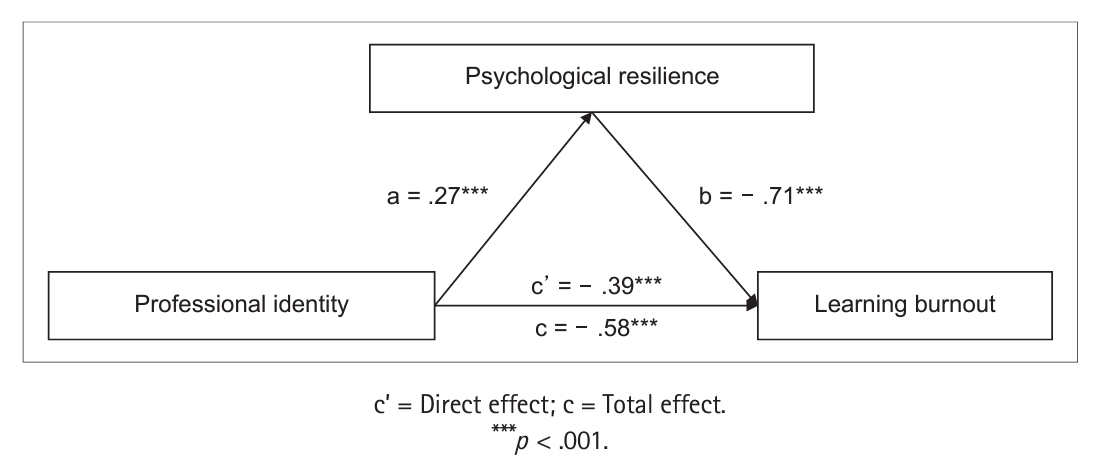Search
- Page Path
- HOME > Search
- The Mediating Role of Psychological Resilience in Chinese Nursing Students’ Professional Identity and Learning Burnout
- Liu Zhang, Qin Zhang, ShuWen Li, YuHong Li, GuoCui Wu, Ying Chen, YunNa Zhou
- J Korean Acad Nurs 2024;54(4):509-518. Published online November 25, 2024
- DOI: https://doi.org/10.4040/jkan.24044

-
 Abstract
Abstract
 PDF
PDF ePub
ePub Purpose This study investigated whether professional identity predicts learning burnout among Chinese nursing students, and whether resilience moderates this relationship.
Methods This cross-sectional study recruited 635 students from a nursing college at a medical university in Hefei, China. Data were collected using the professional identity questionnaire, learning burnout scale for college students, and 10-item Connor-Davidson Resilience Scale. Pearson’s correlation analysis was used to investigate the relationships between variables. The mediation effect was evaluated using linear regression and the bootstrap method in SPSS.
Results Nursing students exhibited intermediate learning burnout levels (score: 54.95 ± 10.42). Professional identity was positively correlated with psychological resilience (r = .42,
p < . 001), whereas learning burnout was negatively correlated with professional identity (r = - .54,p < . 001) and psychological resilience (r = - .57,p < . 001). Psychological resilience mediated the relationship between professional identity and learning burntout to the tune of 32.8%.Conclusion Psychological resilience mediates the relationship between professional identity and learning burnout. Thus, nursing educators can mitigate student burnout by developing their students' professional identities and psychological resilience.
-
Citations
Citations to this article as recorded by- The impact of creative anxiety on professional identity among master’s nursing students: a chain mediation effect of psychological resilience and achievement motivation
Yao Ding, Xiaolan Guo, Ruifeng Wang, Lu Xu, Shajie Hou, Fengjiao Chang
BMC Nursing.2025;[Epub] CrossRef - Sense of Coherence and Perceived Academic Stress Among Nursing Students: A Multicenter Cross-Sectional Study
David Ballester-Ferrando, Esther Cáceres-Malagelada, Carolina Rascón-Hernán, Teresa Botigué, Ana Lavedán, Olga Masot, Dolors Burjalés, Luis González-Osorio, Ximena Osorio-Spuler, Eva Serrat-Graboleda, Concepció Fuentes-Pumarola
Nursing Reports.2025; 15(8): 288. CrossRef
- The impact of creative anxiety on professional identity among master’s nursing students: a chain mediation effect of psychological resilience and achievement motivation
- 4,178 View
- 180 Download
- 2 Web of Science
- 2 Crossref

- Role Transition from Clinical Nurse to Case Manager for Medical-aid Beneficiaries: Taking Root in a Barren Land
- Eun-Jun Park, Chunmi Kim, Seung Joo Lim
- J Korean Acad Nurs 2012;42(2):149-160. Published online April 30, 2012
- DOI: https://doi.org/10.4040/jkan.2012.42.2.149
-
 Abstract
Abstract
 PDF
PDF Purpose The purpose of this study was to explain the role transition process to nurse case managers (NCMs) for Medical-aid beneficiaries in Korea.
Methods Fourteen NCMs were interviewed regarding their experiences of becoming proficient in the new role of case manger. Data were analyzed through the application of grounded theory.
Results 'Taking root in a barren land' was the core category explaining the role transition process of NCMs. They engaged in four stages: launching, trial and error, proficiency, and wait-and-see stages. NCMs showed not only fear but also passion for case management practice. Despite their passion and effort, NCMs went through a period of trial and error. After becoming skilled, NCMs went through a stage of wait-and-see often because of job insecurity related to temporary position or few opportunities for promotion. Factors influencing NCMs' role transition process included their understanding of client characteristics, belief in case management, and support from their colleagues and families.
Conclusion NCMs experience many challenges in the process of becoming proficient NCMs. To help with their role transition, there is a need for education programs, preceptorship programs, research on their roles and functions, and regulation for securing NCMs' employment and career stability.
-
Citations
Citations to this article as recorded by- Experience of Clinical Adaptation among Nurses in Intensive Care Unit
Jin Young Hong, Sue Kyung Sohn
Journal of Korean Critical Care Nursing.2024; 17(1): 1. CrossRef - Perceived barriers to implementing case management for medical‐aid beneficiaries in South Korea
Jeonghyun Cho, Chongwon Park, Jinah Lee, Jiyoung Park
Health & Social Care in the Community.2022; 30(1): 372. CrossRef - Effects of Medicaid Case Manager's Communication Competence and Stress on Their Job Satisfaction
Seung Joo Lim
Journal of Korean Academy of Community Health Nursing.2019; 30(2): 195. CrossRef - Case management effectiveness for managing chronic illnesses in Korea: a systematic review
J.Y. Joo, M.F. Liu
International Nursing Review.2019; 66(1): 30. CrossRef - Experience of Hospital Administrative Nurses' Work Adjustment
Hyun-Ju Lee, Jae-Hyun Ha, Yun-Seo Jung, Jungmi Yun
Journal of Korean Academy of Nursing Administration.2019; 25(5): 424. CrossRef - The Coping Experience of Nursing Students in Clinical Practice: Trying to be a Meaningful Presence
Doo Nam Oh, Young-Rhan Um, Chunmi Kim, Sejin Ju, Jung Hyun Choi, Myung Sook Park
The Journal of Korean Academic Society of Nursing Education.2016; 22(4): 430. CrossRef
- Experience of Clinical Adaptation among Nurses in Intensive Care Unit
- 923 View
- 0 Download
- 6 Crossref

 KSNS
KSNS
 E-SUBMISSION
E-SUBMISSION

 First
First Prev
Prev


